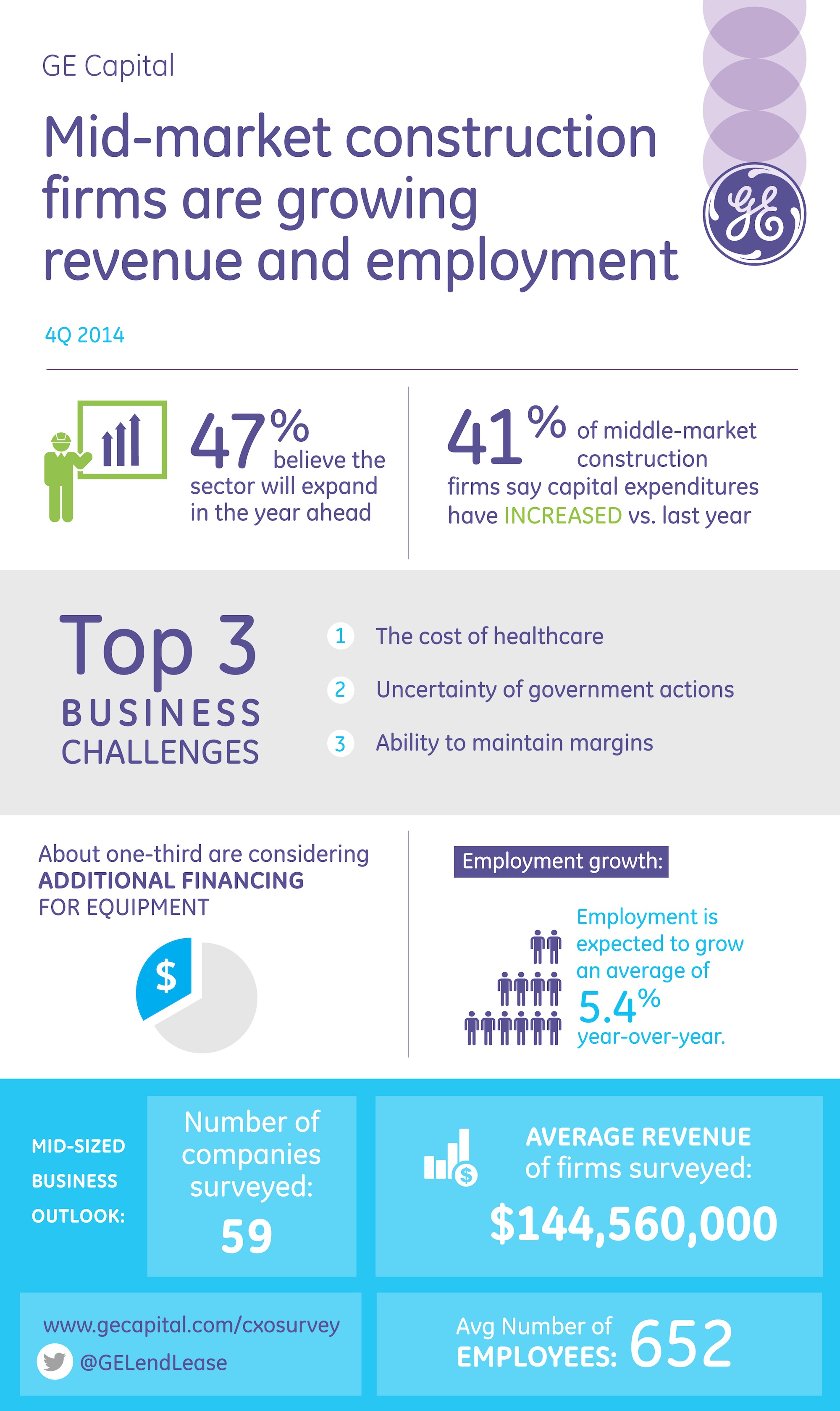Uncertainty about government spending clouds an otherwise positive economic outlook among 59 middle market construction firms polled recently by GE Capital.
Those firms—which average 652 employees and $144.6 million in annual revenue—are particularly confident about U.S. and local markets, though less so about the global arena. Only 12% of those polled said they were “extremely confident” about the condition of global economies, versus 21% who felt the same way about the U.S. economy, and 42% who liked what they were seeing about their local economies.
The firms’ confidence reflects their financial performance. Seven of 10 respondents reported improvements in their companies’ financials as of September 2014, versus fewer than three in five polled last March.
However, while half of the construction firms surveyed said they were hiring more people, the number was slightly down from the 57% who were hiring last March. The good news is that nearly half of the firms polled—47%—expect the construction industry to expand through September 2015, during which construction-related employment is expected to increase by 5.4%.
The survey’s respondents see the energy sector as holding out the greatest potential for future construction projects and hiring. Office and residential projects are also expected to be stronger. But a lot of these firms’ optimism seems contingent on public works spending, which “continues to have an immense impact on the industry and is a key consideration in expenditure decisions,” according to GE Capital.
Another factor that is likely to impact construction firms’ profitability is the direction that healthcare costs take. One-third of respondents are anticipating an increasing cost structure. Still, the respondents expect their margins to grow by average of 3.7% over the next year, which greatly exceeds the 0.2% growth that respondents were projecting last March.
GE Capital produces its quarterly surveys in cooperation with the National Center for the Middle Market, a multiyear partnership between GE Capital and Ohio State University’s Fisher College of Business. For more information about construction and other industries, visit gecapital.com/cxosurvey.
Related Stories
| Aug 11, 2010
29 Great Solutions for the AEC Industry
AEC firms are hotbeds of invention and innovation to meet client needs in today's highly competitive environment. The editors of Building Design+Construction are pleased to present 29 "Great Solutions" to some of the most complex problems and issues facing Building Teams today. Our solutions cover eight key areas: Design, BIM + IT, Collaboration, Healthcare, Products, Technology, Business Management, and Green Building.
| Aug 11, 2010
Permanent tribute to Daniel Burnham and his Plan of Chicago proposed for Grant Park Museum Campus
The first-place winner of a design competition for a public memorial celebrating Daniel Burnham's impact on Chicago will be announced at a news conference Wednesday, July 8, at 10am CDT. The proposed site for the memorial is on the Museum Campus just north of The Field Museum. The announcement comes after nearly two years of planning by Chicago's architecture, design and urban planning community about how to best honor the legacy of Burnham and the Plan of Chicago he co-wrote with Edward Bennett.
| Aug 11, 2010
Arup, SOM top BD+C's ranking of the country's largest mixed-use design firms
A ranking of the Top 75 Mixed-Use Design Firms based on Building Design+Construction's 2009 Giants 300 survey. For more Giants 300 rankings, visit http://www.BDCnetwork.com/Giants
| Aug 11, 2010
Architecture billings index takes turn for the worse
After showing signs of stabilization over the last three months, the Architecture Billings Index (ABI) plunged nearly five points in June. As a leading economic indicator of construction activity, the ABI reflects the approximate nine to twelve month lag time between architecture billings and construction spending. The American Institute of Architects (AIA) reported the June ABI rating was 37.7, far lower than the 42.9 the previous month.
| Aug 11, 2010
International Living Building Institute established to advance 'living buildings'
The idea of a Living Building, a high-performance building that produces its own power and cleans and reuses all of its water, is gaining momentum around the world. In an effort to oversee the global development of Living Buildings, the International Living Building Institute (ILBI) has been established.
| Aug 11, 2010
Populous selected to design 'crystalline skin' stadium for 2014 Winter Olympics
Russian officials have selected global architect Populous to design the main stadium for the 2014 Winter Olympic and Paralympic Games in Sochi, Russia. The 40,000-seat stadium will feature a crystalline skin that "engages with its surroundings by day and provides an iconic representation of the color and spectacle of the games when illuminated at night," said Populous senior principal John Barrow.
| Aug 11, 2010
M&A deal volume down 67% in engineering/construction sector: PricewaterhouseCoopers
Global Economic Uncertainty Results in Sluggish Deal Activity in U.S.; China Shows Significant Opportunity for Growth
| Aug 11, 2010
Three Opus Corporation companies file for bankruptcy
Opus Corporation, a developer headquartered in Minnetonka, Minn., filed for bankruptcy in three of its five regional operating companies: Opus East, Opus South, and Opus West. CEO Mark Rauenhorst said sharp declines in commercial real estate values and tight credit markets caused difficulties in refinancing assets and restructuring lending agreements.








